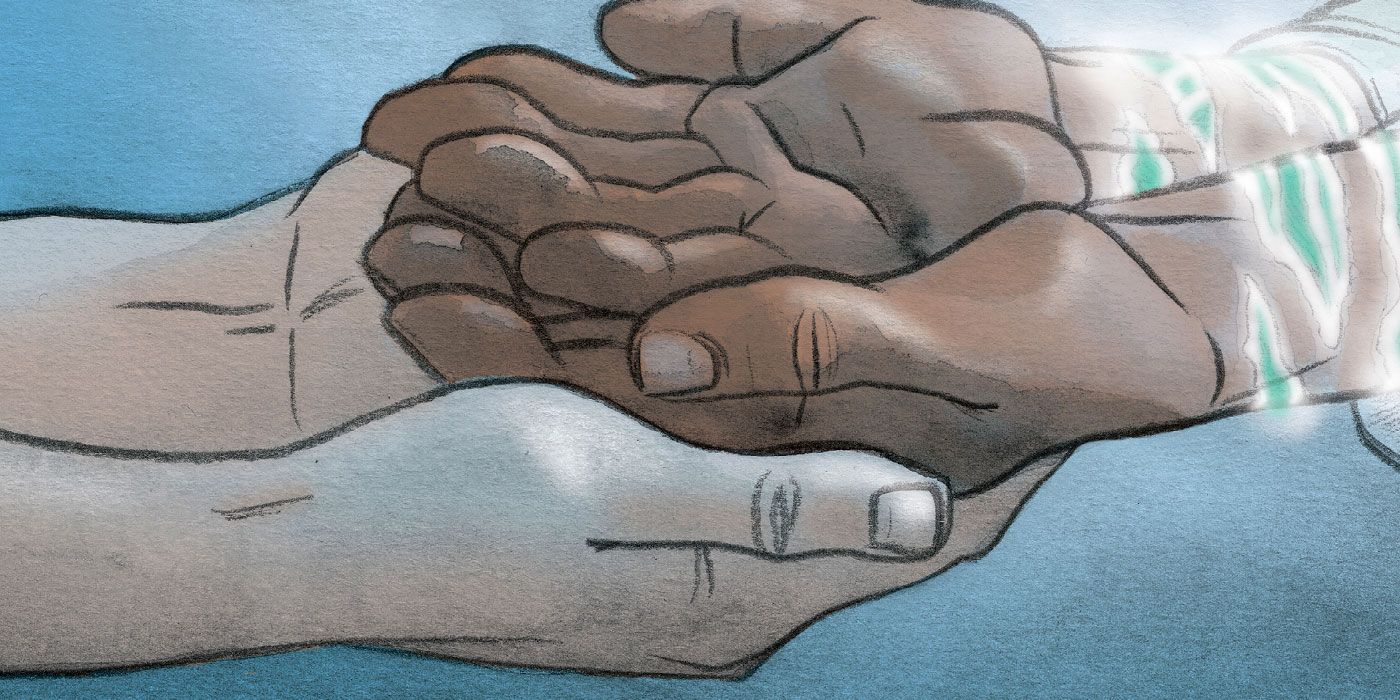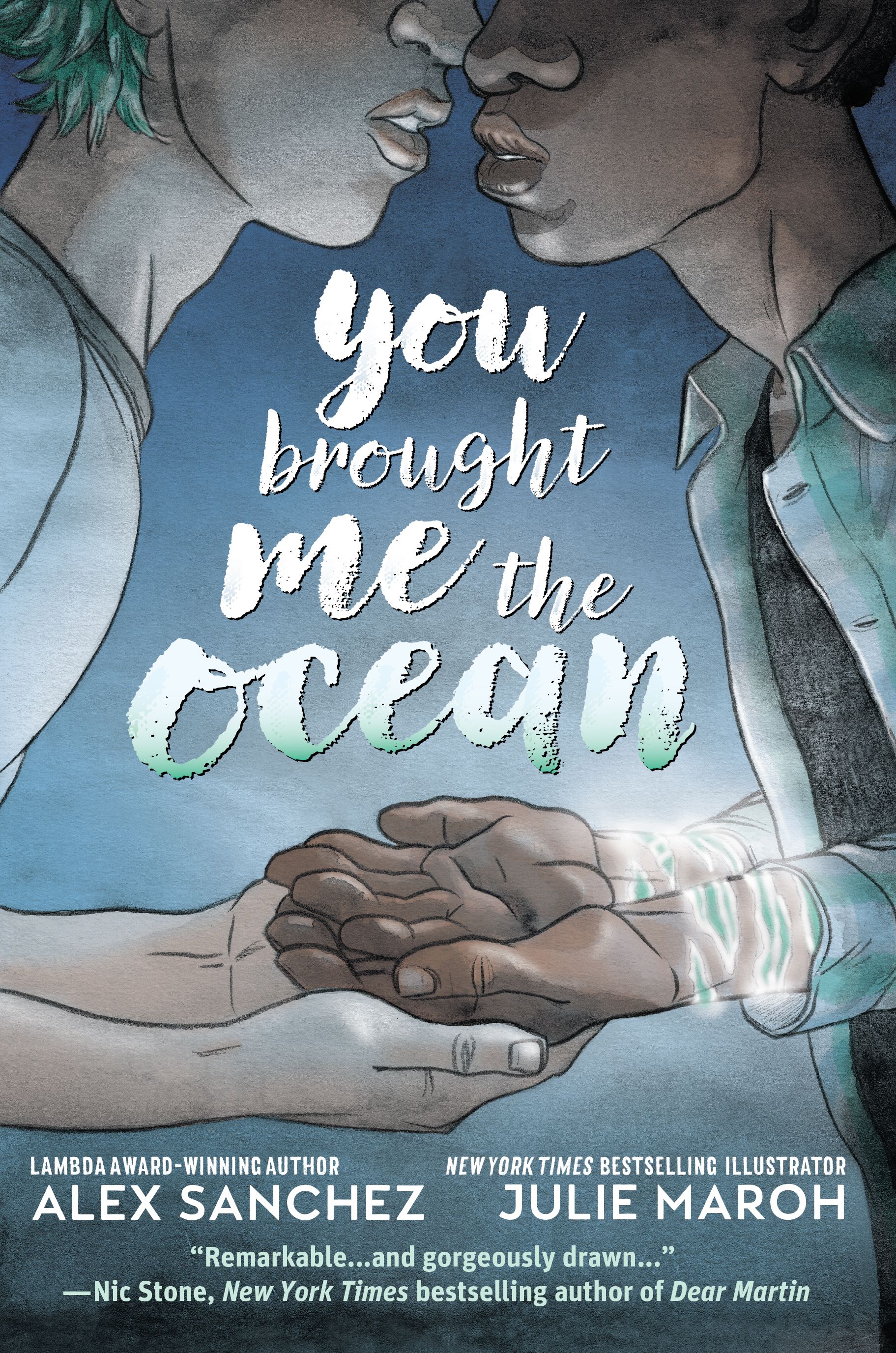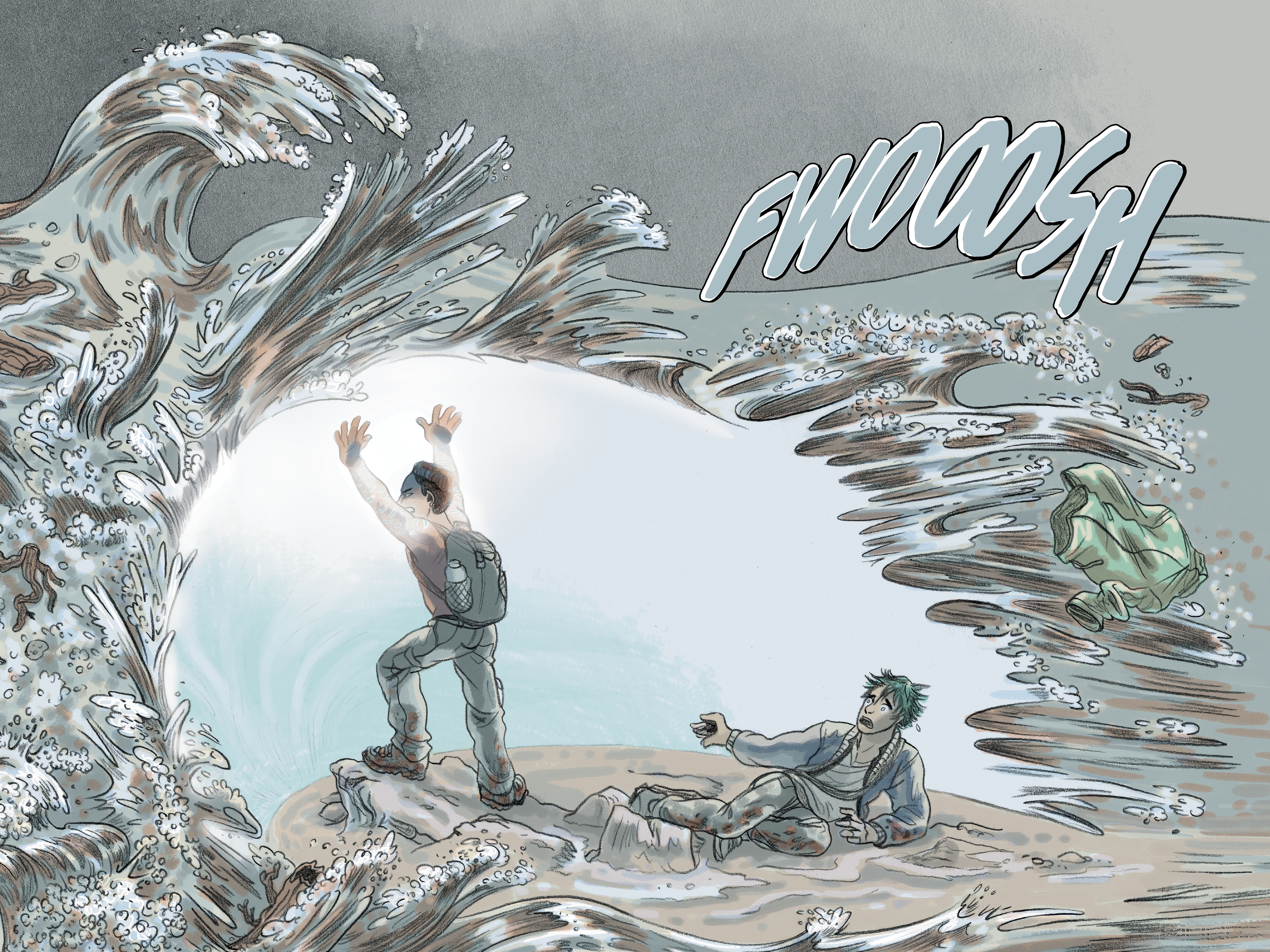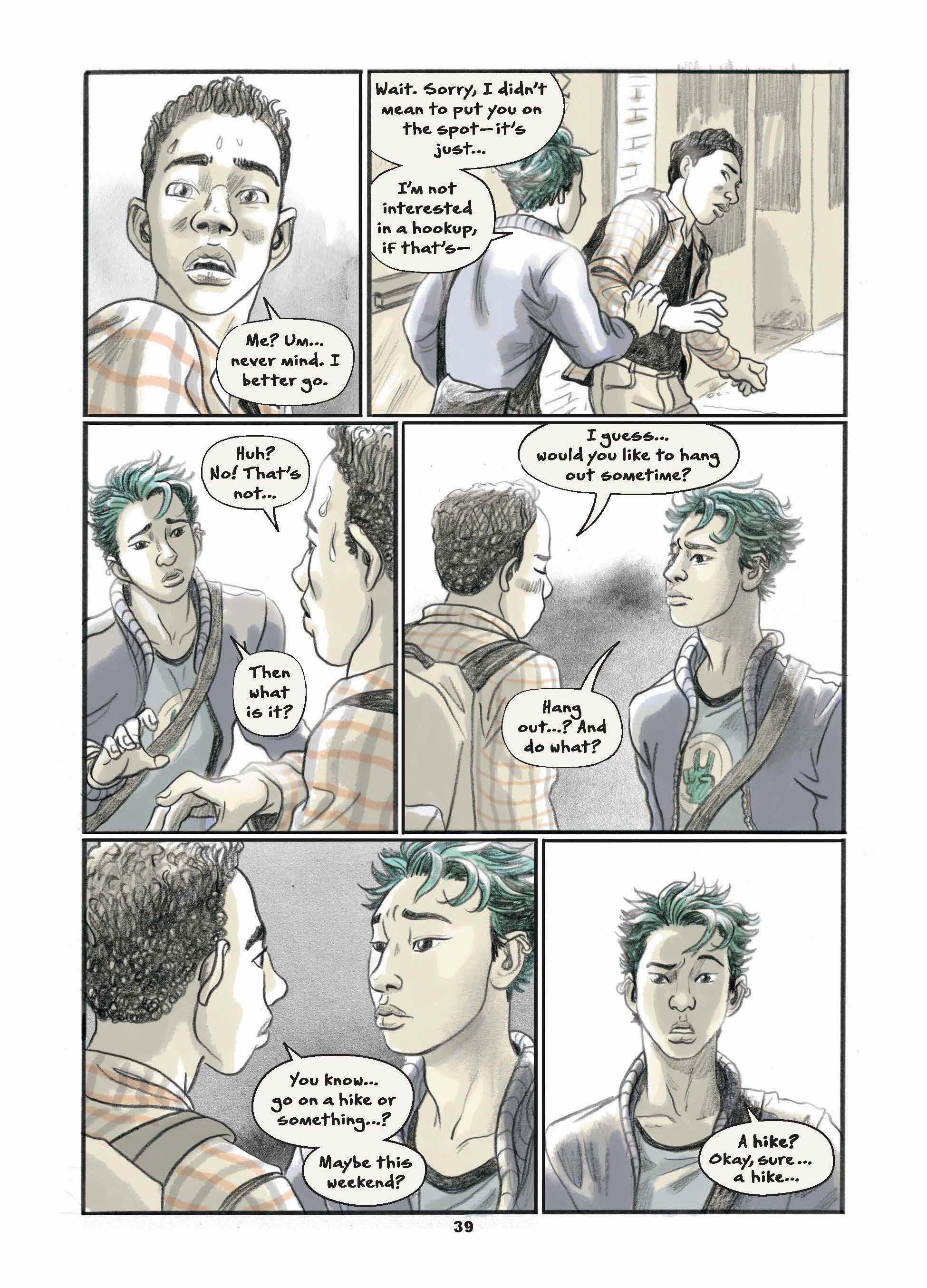DC's new original graphic novel, You Brought Me the Ocean, introduces a new -- but also very familiar -- take on Aqualad. Written by Lambda Literary Award-winning author Alex Sánchez, illustrated by New York Times-bestselling cartoonist Jul' Maroh and lettered by Eisner and Harvey Awards nominee Deron Bennett, the book follows Jake Hyde as he discovers his ocean-based powers while simultaneously coming to terms with his sexuality.
Truth or Consequences, New Mexico is about as far from the ocean as Jake can get. If anything, that just increases his desire to study oceanography at the University of Miami next year. As he attempts to navigate college applications, a lifelong friendship, a burgeoning crush and the unexpected development of his latent superpowers, Jake also has to deal with homophobic bullying and the discovery that his real father is the supervillain Black Manta.
Ahead of the June 9 release of You Brought Me the Ocean, CBR spoke with Sánchez and Maroh in separate interviews about the book, how they reimagined core aspects of the Aqualad origin story and why it was important to explore queerness through the superhero lens.
CBR: How did you conceptualize the story and art for You Brought Me the Ocean?
Alex Sánchez: The creative process is such that it's always hard to remember exactly how it came about. When DC first contacted me and asked me to put a pitch together about Aqualad -- a character I wasn't that familiar with -- I did a little bit of research and thought, "OK, water. How can water be a metaphor?" They really encouraged me to make the story my own and told me not to be too wedded to previous versions of Aqualad, so I liked the idea -- from the little bit of research I did -- of setting it in New Mexico and getting him away from the water, then exploring fear of the water and, at the same time, being attracted to it.
Then, I started bringing in parts of myself. I've had a lifelong love of the ocean. I dream about it at least once a week; [I have] all through my life, even now. So, I was attracted to this character who loves the ocean and is so drawn to it. [I also brought in] my own growing up and struggling with my sexuality and trying to figure out who I was. Then it all started coming together, you know, the romance aspects and the wedge that keeps them apart... I hope you can hear how I'm describing it. All these pieces start coming together in the subconscious, as it were, and then the characters start coming to life. A lot of it is my story and a lot of it is definitely not my story. That's the magic of writing fiction: Bringing imagination into play with all these other, realistic components.
Jul' Maroh: First of all, the fact that DC wanted to give a fresh new take to Jake’s character gave me the opportunity to explore all the ideas I had. When I came onto the project, Alex had already shaped Jake’s teenage personality and I did my best to expand it with my artwork. For example, it was very enthralling for me to design Jake’s marks based on aquatic creatures and to bring to life how he activates his powers.
Regarding the storytelling and colors, I tried to keep all of it breathing and balanced between two kind of atmospheres. If you pay attention, you’ll realize that the environment in which Jake grew up is dry, warm, arid. Then, water and love enters his life. So the story flows between two colored atmospheres expressing the contrast and changes occurring in his life.
Alex, this is your first graphic novel -- what was different about writing for a graphic novel versus writing prose?
Sánchez: Usually, when I write prose, I write a whole manuscript and go through different revisions, but I write out the whole thing and then have it. In this case, it was very different in that, I had written a 12-page synopsis of the story, but then working with the editor and artist, it became -- "OK, first we're going to work on the first act. After that, we'll develop the script for the second, third and fourth part." So it was like, "Wait a minute! You don't write the whole thing first?" That was wild.
It was also a very collaborative process. Working with the editor, then working with Jul' -- they came in and it was much more of an incremental process. Also, when I write, I have a vague idea of what the characters are going to look like, but then turning that over to an artist and seeing what they came up with -- that was such a magical experience. It was, "Huh. That's not exactly what I thought they would look like, but yeah! I like that!" Jul' did such gorgeous illustrations and seeing how much they were able to put into pictures -- you know the old adage, a picture's worth a thousand words. And Jul', I think, with their talent and how much emotion they put into those drawings just complement the text so much.
Those were all different pieces that were unexpected and surprising and wonderful.
Jul', what were your main goals for this book? How collaborative was the process?
Maroh: My purpose was to wholeheartedly give justice to Jake’s feelings. I’ve been a queer teenager who had to constantly struggle with my own questions and fears and I’ve had to come out, as well! So I felt close with Jake and his overwhelming emotions, but also with Kenny, who is a step ahead in his acceptance, impatient and angry with the heteronormative status quo. I focused my work on their body language and showing their feelings. I’ve always loved how comics are a great tool to transcribe our inner worlds.
Alex and I turned out to be a perfect team! When it comes to narratives, we share the same interests; we focus on the same things. Alex’s script was so descriptive in detailing facial expressions and gestures, which allowed a sort of agreed-upon dialogue to take place between us. When one of us had any doubts or questions, we were able to communicate openly about them.
Prior to working on You Brought Me the Ocean, were you very familiar with Aqualad, Black Manta and the main DC Universe?
Maroh: I must confess I was not very familiar! Looking back, I believe this was a good thing, because I had no predispositions or feelings about the characters. Having not been previously connected to this universe, I didn’t feel pressured by my own expectations or other people’s expectations. That said, our editor, Sara Miller, was essential in ensuring that our reimagination stayed true to the core elements of each character.
What was it like to explore Jake's origin story?
Sánchez: It was really because DC said, "Make this your own," that I didn't feel bound or constricted. It was -- if I were to tell a superhero origin story, what is the story that I would like to tell? I think that is where the sense of metaphor came in. For me, growing up queer was always a sense of having a secret identity and living this double life, which basically is the traditional sort of superhero story. So then, how can I use that superhero origin story as a metaphor for growing up LGBTQ?
For Jake, it's having a secret life on two levels -- both in terms of not understanding his superpowers and keeping those closeted, so to speak, and at the same time being uncertain about his sexuality and what that meant, whether he was gay or bi or what was going on for him. It was exploring that struggle and then connecting that back to my own story, my own growing up and my confusion and uncertainty about my sexuality -- then coming out the other end with this wonderful metaphor of how, when we can fully accept and be true to who we are, that's really our power. That's what makes us unique from everyone else in the universe.
Maroh: It was a meaningful journey. To be a Black, gay teenager discovering your identity, your special powers, the place that society has already set up for you -- not to mention learning about your dad, who’s this supervillain breaking news on TV -- how would you feel about yourself and your place in the world? It’s too much to deal with! It’s been intense to explore the different levels and depths of Jake’s life.
What do you hope readers take away from You Brought Me the Ocean?
Sánchez: What I hope they take away is basically that idea of empowerment, that when we can be true to who we are, then we can really share ourselves with the universe and not only love ourselves, but love others. It's this idea we talk about in young adult circles, how books can act as mirrors and windows. For queer readers, the reality is that homophobia does persist. Bullying continues. Yet, at the same time, there's been this amazing cultural shift, where LGBTQ people have so much more visibility and acceptance. For queer young people to be able to see themselves in print, it's like, "Yeah! There's someone else like me!" For non-queer readers, to have a window into what it's like to grow up LGBTQ is just as important.
Maroh: Empowerment. The feeling that nothing is settled for you in advance. When you realize your true essence, your pure diamond that no external condition can spoil -- when you find trust and love for who you are -- you also discover your place in the world.
In terms of the shift toward better representation in young adult books, are you seeing a similar shift in comics and graphic novels?
Sánchez: That's certainly my hope and it's certainly part of why I'm so delighted to be working with DC. It's definitely making that push toward giving an accurate portrayal of the diversity of our world. Going back to Rainbow Boys, which came out almost 20 years ago -- at the time, it was seen as groundbreaking and it opened the doors for so much more representation in young adult literature. I see this as a continuation of that. There have been more and more graphic novels giving representations of LGBTQ young people and my hope is that You Brought Me the Ocean -- coming with endorsement from a publisher that created icons like Superman, Batman and Wonder Woman -- will open more doors.
I think superheroes, for young people, are sort of like celebrities. When a celebrity comes out, what a big impact that has. When a DC icon like Aqualad not only identifies as gay but has a romance, that whole emotional aspect can mean so much to a young person: "I may get bullied at school and my parents don't understand me, but there's hope out there. I can find love and love and be loved by someone."
Do you have a favorite DC character?
Sánchez: Because of the water aspect, it would be Aquaman. When I see him in the ocean, I want to be there.
Would you ever want to revisit Jake and these characters, or do you feel as though you've told as complete a tale as you can?
Sánchez: Well, part of what happens when I write, is I really fall in love with my characters. I want to hang out with them and spend time with them, so if DC presented the opportunity to do a sequel or a series, I would love that. I would love to see how these characters can be challenged and grow through new experiences. Part of the appeal of the book for me is the whole aspect of friendship -- how these characters are friends, become friends, the challenges of friendship and how they work through that. I think that's part of the appeal for readers, as well; it's something we always hanker for, is friends.
Maroh: Sure! I feel connected to them now. I would also love to see others provide fresh takes on this character, as well.
What are you working on now?
Sánchez: I just finished working with an editor on a new middle grade novel, which will come out in spring 2021, called The Greatest Superpower. It's a prose novel with some comic book aspects in the storyline.
Maroh: Ugh, a never-ending process of historical research on the Italian Renaissance. I hope to see the end of it before turning 80! I started to work on this graphic novel bit by bit years ago. It’s a love story and personal quest set in 15th century Florence. It’s a religious, political thriller mainly related to what is called the “Congiura dei Pazzi,” one of the biggest plots ever attempted against the Medici family, which ruled the city at that time.
Aside from this book, I’m also busy with a few other projects connected to my spirituality and, let’s say, with healing narrative tools. If you look for me on Instagram, I sometimes share things there.
Is there anything you'd like to add?
Maroh: Given all that is at stake at the moment, with Black Lives Matter, with LGBTQ+ rights, I sincerely hope You Brought Me the Ocean will help those who are struggling to live their lives. Intersectionality is a conversation that cannot be avoided anymore and we need to unite our fights. In the United States, more than 80 percent of the victims reported for anti-LGBTQ+ crimes are people of color and black trans women remain the main victims of murders in the community. I hope that during this Pride Month, which coincides with the release of our book, we will be able to express our resistance.




